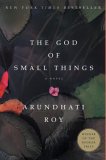Summary | Excerpt | Reading Guide | Reviews | Readalikes | Genres & Themes | Author Bio

When Khubchand, his beloved, blind, bald, incontinent seventeen-year-old mongrel decided to stage a miserable, long-drawn-out death, Estha nursed him through his final ordeal as though his own life somehow depended on it. In the last months of his life, Khubchand, who had the best of intentions but the most unreliable of bladders, would drag himself to the top-hinged dog-flap built into the bottom of the door that led out into the back garden, push his head through it and urinate unsteadily, bright yellowly, inside. Then, with bladder empty and conscience clear, he would look up at Estha with opaque green eyes that stood in his grizzled skull like scummy pools and weave his way back to his damp cushion, leaving wet footprints on the floor. As Khubchand lay dying on his cushion, Estha could see the bedroom window reflected in his smooth, purple balls. And the sky beyond. And once a bird that flew across. To Estha--steeped in the smell of old roses, blooded on memories of a broken man--the fact that something so fragile, so unbearably tender had survived, had been allowed to exist, was a miracle. A bird in flight reflected in an old dog's balls. It made him smile out loud.
After Khubchand died, Estha started his walking. He walked for hours on end. Initially he patrolled only the neighborhood, but gradually went farther and farther afield.
People got used to seeing him on the road. A well-dressed man with a quiet walk. His face grew dark and outdoorsy. Rugged. Wrinkled by the sun. He began to look wiser than he really was. Like a fisherman in a city. With sea-secrets in him.
Now that he'd been re-Returned, Estha walked all over Ayemenem.
Some days he walked along the banks of the river that smelled of shit and pesticides bought with World Bank loans. Most of the fish had died. The ones that survived suffered from fin-rot and had broken out in boils.
Other days he walked down the road. Past the new, freshly baked, iced, Gulf-money houses built by nurses, masons, wire-benders and bank clerks, who worked hard and unhappily in faraway places. Past the resentful older houses tinged green with envy, cowering in their private driveways among their private rubber trees. Each a tottering fiefdom with an epic of its own.
He walked past the village school that his great-grandfather built for Untouchable children.
Past Sophie Mol's yellow church. Past the Ayemenem Youth Kung Fu Club. Past the Tender Buds Nursery School (for Touchables), past the ration shop that sold rice, sugar and bananas that hung in yellow bunches from the roof. Cheap soft-porn magazines about fictitious South Indian sex-fiends were clipped with clothes pegs to ropes that hung from the ceiling. They spun lazily in the warm breeze, tempting honest ration-buyers with glimpses of ripe, naked women Lying in pools of fake blood.
Sometimes Estha walked past Lucky Press--old Comrade K.N.M. Pillai's printing press, once the Ayemenem office of the Communist Party, where midnight study meetings were held, and pamphlets with rousing lyrics of Marxist Party songs were printed and distributed. The flag that fluttered on the roof had grown limp and old. The red had bled away.
Comrade Pillai himself came out in the mornings in a graying Aertex vest, his balls silhouetted against his soft white mundu. He oiled himself with warm, peppered coconut oil, kneading his old, loose flesh that stretched willingly off his bones like chewing gum. He lived alone now. His wife, Kalyani, had died of ovarian cancer. His son, Lenin, had moved to Delhi, where he worked as a services contractor for foreign embassies.
If Comrade Pillai was outside his house oiling himself when Estha walked past, he made it a point to greet him.
"Estha Mon!" he would call out, in his high, piping voice, frayed and fibrous now, like sugarcane stripped of its bark. "Good morning! Your daily constitutional?"
1997 Arundhati Roy All Rights Reserved.
Your guide toexceptional books
BookBrowse seeks out and recommends the best in contemporary fiction and nonfiction—books that not only engage and entertain but also deepen our understanding of ourselves and the world around us.